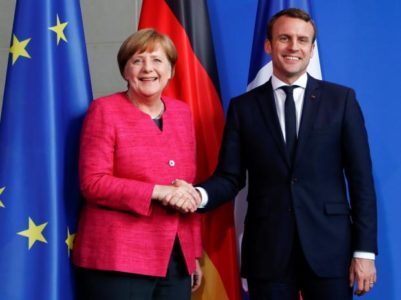Thanks for the conference! French election: consequences for Europe and Franco-german relations @MarkusFerber @PJoannin @Dr.Osteo-Stierl pic.twitter.com/PBSfw8qeFy
— CFEP (@CfEP_) 7 giugno 2017
The beginning of May was determining for the future of the EU, the French presidential election was decisive for our Europe. The duel was unusual for France, the young Macron with his new party “En Marche” against the dynastic legacy of Marine Le Pen. The results of this election would dictate the future of intra-EU relations and in particular the Franco-German relation.
The election of Emmanuel Macron was a relief for Europe, regardless; the question remains the same. “What is going to happen from the Franco-German relationship?” This relationship unfortunately flouted and neglected during this last years.
In order to try to answer this question, the Hanns Seidel Foundation and the Robert Schuman Foundation organized a conference on the future of this relationship. The panel was composed of both German and French people in order to be able to explore the subject on each side of the relationship. On the French side, we had Pascale Joannin who is the Director General of the Robert Schuman Foundation and the moderator was Florence Autret, a journalist and author.
On the German side we had Markus Ferber who is the Vice-Chair of the Hanns Seidel Foundation and the first Vice-Chair of the Committee on Economic and Monetary Affairs in the EP. There was also Prof. Dr. Patricia Oster-Stierle who is President of the German-French University in Saarbrücken. Together they tried to answer the famous question.
Pascale Joannin introduced the subject by recalling the unusual situation of the French presidential elections that took place at the beginning of May. Indeed these elections are considered as unexpected, the outgoing president does not re-represent, the candidates of the right and the left do not find themselves in the second round. For the first time since the 5th republic, there is not a second round ofleft and right.
Emmanuel Macron succeeded his bid by winning the election with a whole new party and especially without the support of a great/traditional party.
Mrs Joannin reminded us that the French political agenda is not limited to the presidential election but that the legislative elections are close. And that for now the estimations are in favor of the movement “en Marche”.
Emmanuel Macron was the only candidate with a pro-European speech. 8 out of 11 candidates are anti-EU.
Today we had the opportunity to have a taste of what France will look like after the legislative. The results of the first round of legislative elections confirm the estimations, an overwhelming majority for the En Marche party, a majority that dethroned and shadowed the two major French parties, the PS and the UMP.
A new wind strikes France. France is aspiring to change, and this change is literally “En Marche” (Ongoing) without bad puns.
Emmanuel Macron is the renewal of a Franco-German relationship that had become dusty during François Hollande’s term. His strategy was clear and transparent, his choices converging towards a strong relationship. It is not without reason that his first journey was with Madame Merkel, or that five of his ministers speak German.
Pascale Joannin finished her speech with a simple sentence, claiming that Macron is the symbol of the rebirth of European France and that a Franco-German relationship must be two-way.

Merkel and Macron in Berlin – The Indipendent
In reaction to MrsJoannin’s remarks, Markus Ferber explained that he was moved by the results of the presidential election and especially when Emmanuel Macron walked alone carried by the hymn to joy, the European anthem for his victory speech. The renewal brought by Emmanuel Macron is crucial for France and Europe. Francois Holland had stopped the reforms during his term, Macron is a president who wants to serve, to serve the French. It focuses directly on reforms.
Mr Macron is full of good intentions but it is too early to talk about a new relationship.
The relations that are now forming are perhaps ephemeral. Indeed in a few months, the elections in Germany will take place, this means that the German leader could change and the government too. “If we take the German political agenda, the elections bring us to the end of September, then we can count until the end of the year for the formation of a government, so it is only at the beginning of 2018 that the Franco relationship -German will take shape properly speaking.”
Dr. Patricia Oster-Stierle added that, at the academic level, young Germans are in love with France and there is an enormous amount of partnership between universities and German high schools with French faculties and campuses. The only break is the language, both German and French, the students do not learn enough ofeach other’s language for the moment. But one notices a certain progress, the students stagnate. There is a real attraction for Europe and the young Emanuel Macron has an image of Napoleon which arouses enthusiasm among the younger generation.
To conclude, the election of Mr. Emmanuel Macron is a new page in the Franco-German relationship. A page on which rests many expectations and hopes. Both Germany and France are hopeful. Mr. Macron is already on the lookout for a strong relationship and Germany welcomes this new president with open arms. That said it is still too early to judge how this relationship will evolve. Indeed, the German elections are back to us directly at the beginning of January 2018. It is therefore imperative to wait to be able to judge the future of the Franco-German mutual aid.
Dr. OSTER-STIERLE insists, in order to silence the slanderers, that Germany is not to dominate Europe and that thanks to a good Franco-German help is the best way to show it.
